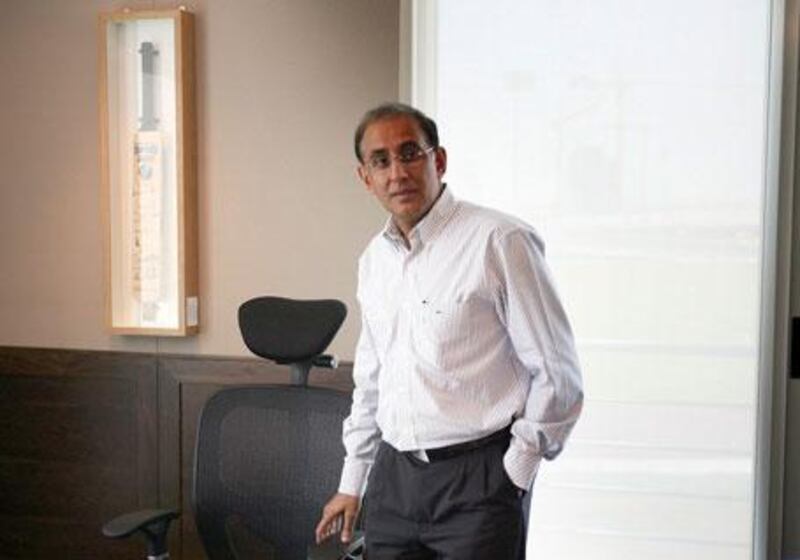DUBAI // Yesterday, a South Africa side which were supposedly riven by a calamitous fall-out brought about by a debate over skin-colour delivered a crushing victory over their closest rivals to the title of "world's best". Their win was set up by a Muslim batsman of Indian extraction, with the knock-out blows executed by a young Afrikaner bowler.
At the same time, a few thousand miles away, a UAE team peopled by expatriates were revelling in a win that was every bit as satisfying in its own way. And, through it all, there was not an Arab player in sight. The World Twenty20 qualifying tournament being staged in Dubai and Abu Dhabi this week is a riot of colour, and that is not solely confined to the team uniforms. The ICC are rightly proud of the cosmopolitanism on display among the eight teams vying for a trip to the Big Show in the Caribbean. It is an example of how ICC funding has seeped through and taken root beyond the game's traditional, old colonial territories.
But whither the Emirati players? Can the development process really be considered a success if the host nation do not have a single indigenous player in the side? Haroon Lorgat, chief executive of the sport's Dubai-based governing body, could not be better placed to argue the point. He was the convenor of selectors when Ashwell Prince was appointed South Africa's first black vice-captain. Lorgat himself had a playing career of great distinction. As a fast-medium bowler, he was described by the respected South African journalist Neil Manthorp as "an outstanding cricketer denied the chance ever to represent South Africa because of apartheid".
"The ideal is to have the locals playing," admitted the Port Elizabeth-born Lorgat. "But you cannot deny that the expats bring the game to the town or country, then people in the local set-up will pick up the game. You need time before they will actually come through." In 2008, the Emirates Cricket Board made a brief attempt to include a quota of four Emirati players in every 16-man senior national squad they selected. They took Salman Farooq, Alawi Shukri, Fahad al Hashmi and Mohammed Tauqir to the Asia Cup in Pakistan that summer, but the UAE's take on the target system unravelled quickly thereafter.
The number of Emiratis playing at the top level has dwindled to the extent that when Tauqir, the long-serving off-spinner, was ruled out of this qualifying event with a hand injury, there were none left. Lorgat says there is a time and a place for implementing quota systems. "To set the record straight, the South African set-up did not have quotas at the national level," he said. "It was lower down the system where a quota system was put in place to give disadvantaged players the opportunity to play.
"As you went up the line there were targets that were put into place. If they were not met, that is different to a quota not being met. I would be reluctant to put quotas into the national set-up, but I think in schools and clubs and other areas, where you could encourage the locals to participate by providing opportunities for them, then it could be considered at that level." However, Lorgat says the "stringent criteria" governing player eligibility in cricket means national teams will only be represented by players who have already displayed a sizeable commitment to that country. "Don't forget, we have quite stringent criteria before you become eligible to play for a national team," said Lorgat.
To represent any of the eight nations competing on these shores this week, a player has to have been resident there for at least four years. Only two per squad are permitted under that eligibility criteria. The rest must be either passport-holders, born there, or resident for more than seven years. "Stringent" seems a fair assessment of those regulations, when set against rugby, which allows players to represent the country where they reside after a mere three years. Many of the UAE squad were born here, yet are not considered nationals.
Naemuddin Aslam, the batsman and occasional wicketkeeper for the national team, was born in Dubai. He is from a family of cricketers who all consider themselves Indian, yet could not be more proud to have their brother representing the UAE. That he ran out Virender Sehwag on his ODI debut is a story for them all to dine out on. Shoaib Sarwar, the all-rounder, was born in Sharjah, where his father has lived for 35 years, after leaving his native Pakistan.
His commitment to the UAE team could hardly be questioned. Ahead of the 2008 Asia Cup he quit his job with an online trading company so he could commit more time to playing cricket. "These guys have all qualified, and they may be living in this part of the world for years and years and years," added Lorgat. "They might regard themselves as people from the UAE, albeit without having national citizenship, but they still qualify in terms of our criteria."






